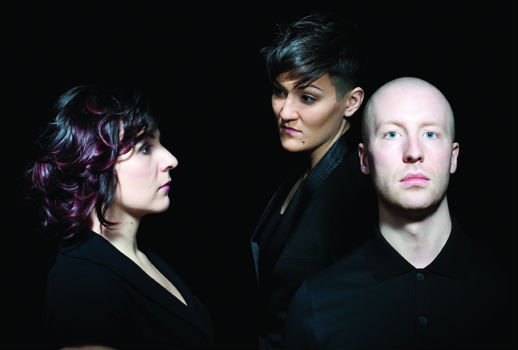
If I were catty (moi?), I’d ponder what other Canadian operas of any sort have been heard, or heard of. Considering how many fine singers Canada produces in every genre, the balance would seem to demand redress. Can the land of Joni Mitchell and Leonard Cohen—never mind Jon Vickers, Ben Heppner and Anna Russell—really lack a national opera?
When the Sun Comes Out does not address any especially Canadian problem. It is set in an invented country, of which we learn only that traditional sex roles are strictly enforced there—clearly nothing like gloriously fusive Vancouver the week after Pride Day. Uyeda might otherwise be a candidate to address the national opera situation.
She writes gracefully for the voice, placing melodious emotional statements in the center of a range rather than shrill or growling extremes: Beautiful voices sound beautiful when singing Uyeda’s music con fuoco. She is unafraid to use melody to express predicament, to underline memory, to pre-echo and postlude a phrase to which she wishes to draw attention, though I’m not sure (on one hearing) that her melodic style is an especially individual one. If she does not oblige her singers to scream, she does have them speak some brutal lines of the libretto, making one wonder if she could not imagine a singable phrase for the sentiments in question.
Withal, Uyeda is skilled at setting her music for a small ensemble, in this case piano, violin, flute, clarinet and cello. The voices were foregrounded and had no trouble making themselves understood.
One operatic tradition that I missed, perhaps because Rachel Rose’s libretto consisted rather of declaimed imagery and verse reflection than of dramatic confrontation and resolution, was the combination of more than one voice to make a unifying or dissident musical point. As in baroque opera, duets are rare, and are not a contrast but a pairing, two voices eliding on a single thought. There was only one. It was a beauty, but Uyeda made us wait ninety minutes for it. Perhaps a more experienced librettist would have given her more opportunities to use opera’s great gift (denied to most spoken drama) of concerted vocal writing, of letting more than one thing happen at once.
The story, set wherever it was set, concerns a rather butch lesbian, Solana, an outcast in her own land, who has wandered from woman to woman until meeting Lilah, unhappily married to a closeted gay husband named Javan. This could be seen as returning to the tradition of Rossini’s serious operas, where the trouser mezzo always took the soprano away from the tenor—except this time the pants are on the soprano. Lilah no longer loves Javan, but cannot leave him because they have a daughter, mercifully kept offstage. Javan surprises the lovers in bed, but his threats are not serious. He’d really rather tell the story of his own murdered lover, Azhar, after whom he has named his daughter. The suggestion that they all settle down to keep each other’s secrets thrills nobody, but no other resolution is acceptable. If this were Verismo there would be blood, if baroque, there would be a joyous volte-face. We do get that duet, and it’s pretty satisfying.
Teiya Kasahara, the Solana, is a strikingly handsome performer with a sizable, velvety soprano, easy and even from top to bottom, and she makes elegant, expressive use of a good trill. She has sung the Queen of the Night and Olympia, but there is nothing of the canary here: Hers is a full, womanly sound, and her diction is clear. Julia Morgan’s mezzo is barely darker in tone and mingled with Kasahara’s as if they were sisters. On a recording, it would be difficult to distinguish one from the other, which makes for a particular kind of sensuality. Tenor Aaron Durand has a lighter, grainier voice. His self-lacerations were credible but not moving. We understood him, but our sympathies remained with the ladies.
The very basic production depends more on backdrop projections (which included the libretto) as on any concrete objects, pretty much confined to a large but otherwise nondescript bed. James Fagan Tait’s direction did not shy from kisses and did not go for gratuitous sex or violence. But then, the composer was conducting, so perhaps she kept him under tight rein.





Comments